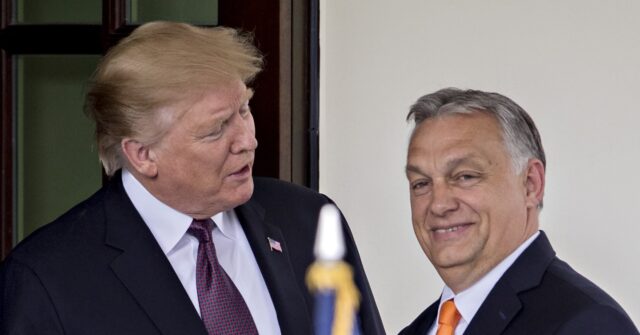Hungarian Prime Minister Viktor Orbán’s recent actions have created significant turbulence in globalist initiatives aimed at funding Ukraine amidst its ongoing conflict with Russia. Orbán’s maneuvering appears strategically timed to enhance the diplomatic leverage of Donald Trump, should he emerge victorious in the upcoming 2024 U.S. presidential election. Trump has publicly committed to negotiating peace to end the violence in Ukraine, aiming to establish a settlement even before formally taking office. His assertion aligns with a growing sentiment among some American and European leaders advocating for a resolution to the prolonged conflict which has led to severe humanitarian and geopolitical consequences.
In response to the war’s escalation following Russia’s invasion of Ukraine in 2022, G7 nations have collaborated to establish a financial package for Ukraine, targeting the provision of a $50 billion loan. This initiative was set to be underpinned by interest accrued from the $250 billion worth of Russian assets frozen by Western countries. However, for the United States to substantially contribute to this plan, the Biden administration requires the European Union (EU) to adjust its sanctions on Russia, extending them for three additional years rather than undergoing biannual renewals. Orbán’s influence within the EU poses significant hurdles for these efforts, granting him de facto veto power over the sanctions due to the need for unanimous consent from member states.
Budapest has signaled its unwillingness to support the extension of sanctions until the conclusion of the U.S. elections, casting a shadow on the G7’s financial strategies. Hungarian Finance Minister Mihaly Varga asserted that the future American administration’s stance on Russia should dictate the EU’s sanctions approach. This calculated delay has drawn the ire of European liberal political factions, with reports suggesting that Orbán’s stance is a deliberate move to bolster Trump’s negotiating position, emphasizing a divergence between nationalist positions in Eastern Europe and the prevailing globalist agenda in the West.
In light of Orbán’s resistance, the EU is employing various pressure tactics against Hungary, which include seeking to rescind its voting rights within the EU Council to diminish Budapest’s influence over Ukraine’s funding decisions. However, Orbán remains steadfast, viewing the EU’s potential sanctions as ineffective unless they solidly address the realities of the war in Ukraine. The tension has escalated into a strategic standoff, with reports indicating that Orbán believes the tide of public opinion in the U.S. is shifting against prolonged involvement in the war, thereby advocating for a peace-oriented approach rather than financial continuation of the conflict.
Moreover, Orbán challenges the narrative that Ukraine can emerge victorious through military means alone, presenting a pragmatic perspective to the European Parliament. He articulated a need for a diplomatic solution, arguing that the ongoing war is unsustainable for Europe, which will ultimately be the default party should the conflict continue without resolution. His candid remarks have ignited discussions within EU circles about the future of the conflict and the viability of prolonged military support for Kyiv, indicating an urgent need for a reevaluation of strategy as the war persists.
As Orbán positions himself as a strong proponent for the return of Donald Trump—a figure he believes is capable of swiftly addressing the tensions between Ukraine and Russia—it raises questions about the broader geopolitical landscape and the implications of national interests diverging within the EU. The stark polarities present in both American and European politics are increasingly manifesting in the realm of international policy toward Ukraine, prompting a reevaluation of alliances and strategies that define modern diplomatic relations as the potential for a new U.S. administration approaches.

